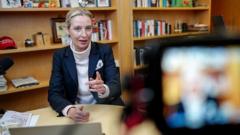In a surprising and controversial move, billionaire entrepreneur Elon Musk hosted a live interview with Alice Weidel, the co-leader of the German far-right party Alternative für Deutschland (AfD), on Thursday. The 74-minute conversation, which took place virtually and was aired on Musk's platform X, covered a wide array of topics, ranging from Germany’s energy policy and bureaucracy to historical reflections involving Adolf Hitler and broader philosophical musings on life.
Musk's endorsement of the AfD has escalated speculation about his involvement in German politics, particularly as the country gears up for a snap federal election scheduled for February 23, 2024. He encouraged viewers to support the AfD in the upcoming elections, framing it as an important alternative within the German political landscape. Many have interpreted this move as the tech mogul's attempt to leverage his substantial investments in Germany—including the construction of a large Tesla factory near Berlin—to bolster his political influence.
Weidel, representing the AfD, adhered to the narrative that her party is mistakenly depicted by mainstream media as extremist, asserting its conservative and libertarian values. Nevertheless, the party has faced scrutiny and been officially designated as having right-wing extremist factions by German authorities. Investigations have previously linked some party members to far-right networks, raising concerns about their ideological leanings.
In what appeared to be a disjointed yet revealing exchange, Weidel made a striking claim about Hitler, describing him as a "communist" and an "antisemitic socialist". Her comments reflect a broader trend of reframing historical narratives among some far-right leaders. Both Weidel and Musk shared light-hearted moments during the conversation, especially when discussing topics like bureaucracy, nuclear power policy, and freedom of speech, creating an unusual atmosphere for a political dialogue.
As discussions surrounding the AfD continue, it's evident that Musk's alignment with its leadership and his bold public comments have not gone unnoticed. German Chancellor Olaf Scholz responded coolly to Musk’s provocations, emphasizing the need for political stability and caution against disinformation.
Despite significant polling support for the AfD, it remains politically isolated, as no other parties are willing to forge coalitions with it. Musk’s overt support has raised alarms among political figures who express concerns about the potential ramifications of such endorsements on the electoral landscape and social dynamics in Germany.
As the political landscape evolves in Germany, the implications of Musk's role and the public's reaction to it will likely continue to unfold, exposing the intricate ties between business, politics, and society.




















